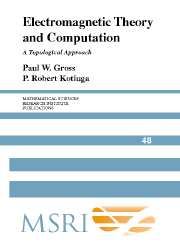Book contents
- Frontmatter
- Table of Contents
- Preface
- Introduction
- 1 From Vector Calculus to Algebraic Topology
- 2 Quasistatic Electromagnetic Fields
- 3 Duality Theorems for Manifolds With Boundary
- 4 The Finite Element Method and Data Structures
- 5 Computing Eddy Currents on Thin Conductors with Scalar Potentials
- 6 An Algorithm to Make Cuts for Magnetic Scalar Potentials
- 7 A Paradigm Problem
- Mathematical Appendix: Manifolds, Differential Forms, Cohomology, Riemannian Structures
- Bibliography
- Summary of Notation
- Examples and Tables
- Index
2 - Quasistatic Electromagnetic Fields
Published online by Cambridge University Press: 06 July 2010
- Frontmatter
- Table of Contents
- Preface
- Introduction
- 1 From Vector Calculus to Algebraic Topology
- 2 Quasistatic Electromagnetic Fields
- 3 Duality Theorems for Manifolds With Boundary
- 4 The Finite Element Method and Data Structures
- 5 Computing Eddy Currents on Thin Conductors with Scalar Potentials
- 6 An Algorithm to Make Cuts for Magnetic Scalar Potentials
- 7 A Paradigm Problem
- Mathematical Appendix: Manifolds, Differential Forms, Cohomology, Riemannian Structures
- Bibliography
- Summary of Notation
- Examples and Tables
- Index
Summary
The purpose of this chapter is to articulate the notion of a quasistatic electromagnetic system, and develop the topological aspects of the boundary value problems encountered in the analysis of quasistatic systems. The topological approach gives a new perspective on variational formulations which form the basis of finite element analysis.
2A. The Quasistatic Limit of Maxwell's Equations Maxwell's Equations.
Let S be a surface with boundary, V a volume in ℝ3, and note that ∂ denotes the boundary operator. The integral versions of Maxwell's equations are as follows.
If we let S′ = ∂V in Ampère's Law (2–3) and remember that ∂∂ = 0, then the field vector can be eliminated between Amp`ere's and Gauss’ law, (2–3) and (2–4) to reveal a statement of charge conservation:
This shows that conservation of charge is implicit in Maxwell's equations. When the surfaces and volumes S, S′, V, V′ are stationary with respect to the inertial reference frame of the field vectors, one can use the standard theorems of vector calculus to rewrite Maxwell's equations as follows.
Equations (2–5)–(2–8) are the differential versions of Maxwell's equations. Equation (2–9) is the differential version of the conservation of charge and can be obtained independently by taking the divergence of Equation (2–7) and substituting in (2–9), remembering that div curl = 0.
Information
- Type
- Chapter
- Information
- Electromagnetic Theory and ComputationA Topological Approach, pp. 49 - 98Publisher: Cambridge University PressPrint publication year: 2004
